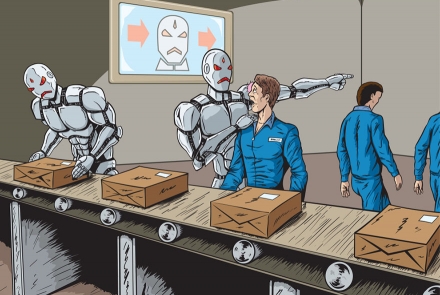
Image: Qniksefat Wikimedia https://commons.wikimedia.org/wiki/File:Robot-job-takeover-unemployment.jpg
Time to tax robots?
On the latest Policy Forum Pod, Crawford School’s Sharon Bessell and Martyn Pearce talk to Professor Roberta Mann about whether we should tax automation as a way of tackling job displacement.
Fears of artificial intelligence taking over the world may still be the stuff of science fiction. However, advances in automation are already having an effect on people and causing unemployment. Could taxing robots be the key to helping people who are now unemployed? On this Policy Forum Pod, the Crawford School chats to Professor Roberta Mann about the benefits and challenges of robot taxation. Listen here
Professor Roberta Mann is an expert on taxation law. She teaches tax and business law at the University of Oregon College of Law.
Before moving to academia, Professor Mann served on the staff of the Joint Committee on Taxation and worked for the Office of Chief Counsel of the Internal Revenue Service in Washington, DC.
She holds an LLM in Taxation from Georgetown University Law Centre, a JD cum laude from the Arizona State University College of Law, and an MBA from Arizona State University.
The world has seen a rise in the number of robots used in businesses. And as machines are entering the workplace, humans are being forced out. What can policymakers do to help the people affected by the rise of automation?
Bill Gates has suggested that the US government should tax the robots that are taking human jobs in an attempt to slow down the spread of automation. It’s an idea worth considering, Professor Mann says.
“In my perspective, the issue really is – are humans being displaced from their jobs? And if so, how are we going to help those humans?”
“Robot taxation is just an avenue to think about how to help humans,” she says. “If you are going to help people, you need revenue.”
Taxing automation creates a source of revenue that can help the people being displaced by machines.
However, Professor Mann stresses that, “You can’t tax robots because they don’t have incomes. You have to tax the owners of the robots.”
Mann emphasises that this robot taxation is “not about stopping automation, but being sensitive to what’s happening to human beings.”
So could a tax on automation be used to finance something like a universal basic income?
Mann argues that rather than making human work obsolete, the revenue from the tax should be used to create jobs, for instance in government infrastructure projects.
“I think that although the universal basic income certainly can be a part of the solution, I don’t think it’s the whole solution,” she says. “People need work.” Although the universal basic income fosters entrepreneurship, “it doesn’t provide actual work,” she said.
In a wide-ranging interview, the podcast also looks at the challenge of taxing something that is both capital and labour, and whether the rise of automation is helping to speed up the emergence of a precariat.
Professor Roberta Mann was in conversation with Sharon Bessell and Martyn Pearce. This episode of the pod was produced and written by Nicky Lovegrove and edited by Martyn Pearce. This blog post was written by Maya Bhandari.
A special thanks to the Austaxpolicy blog, Australia’s leading site for the analysis of tax and transfer policy, based at Crawford School of Public Policy, for making this episode possible.
Policy Forum Pod is available on Spotify, iTunes, Stitcher, and wherever you get your podcasts. Got feedback for us on this pod? Tweet us @APPSPolicyForum or find us on Facebook.
Updated: 22 November 2024/Responsible Officer: Crawford Engagement/Page Contact: CAP Web Team













